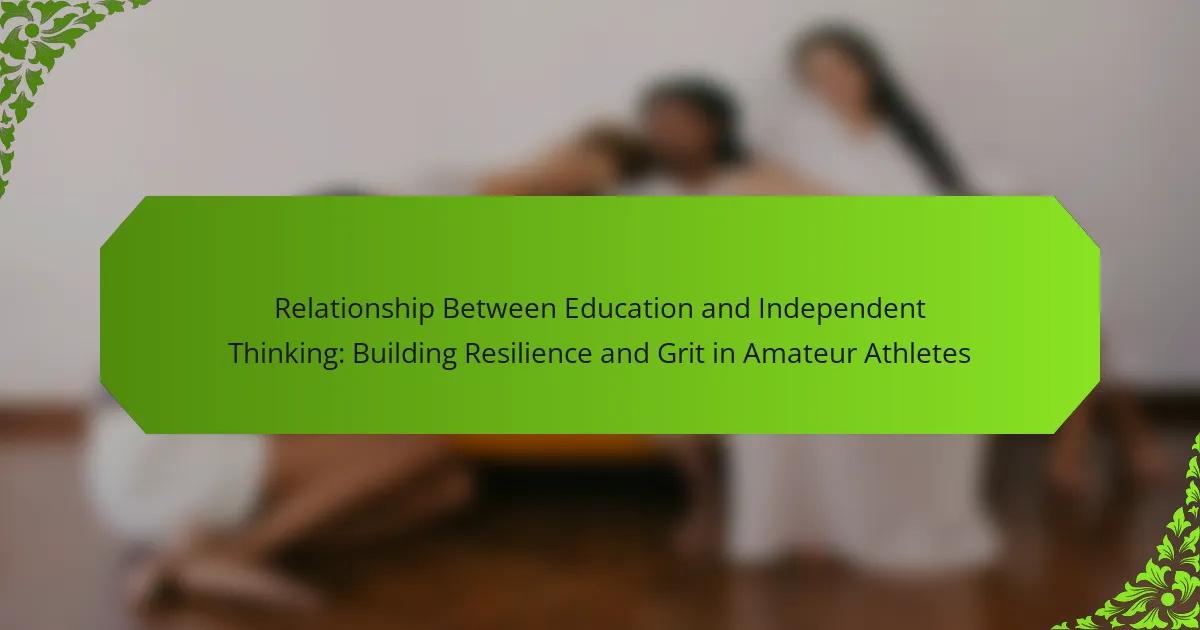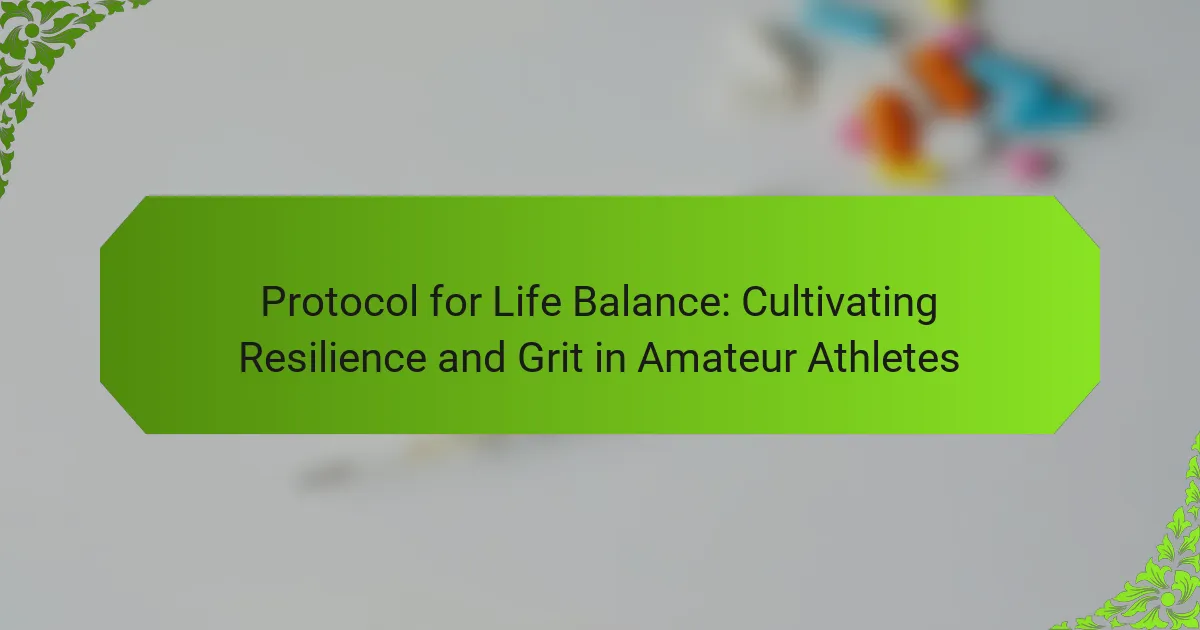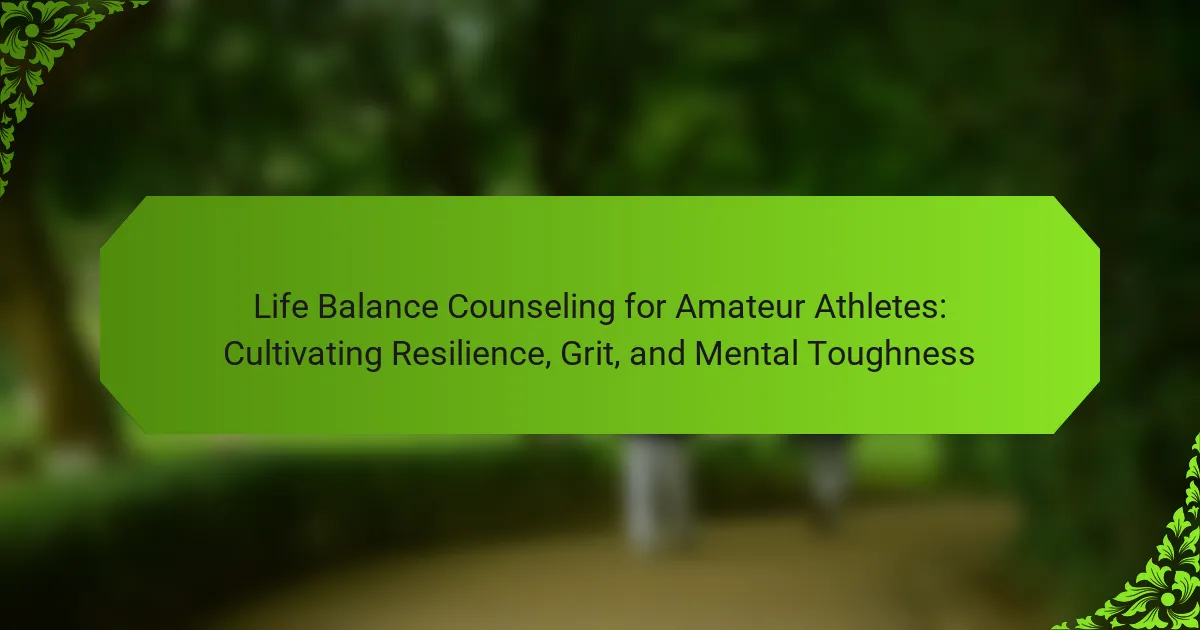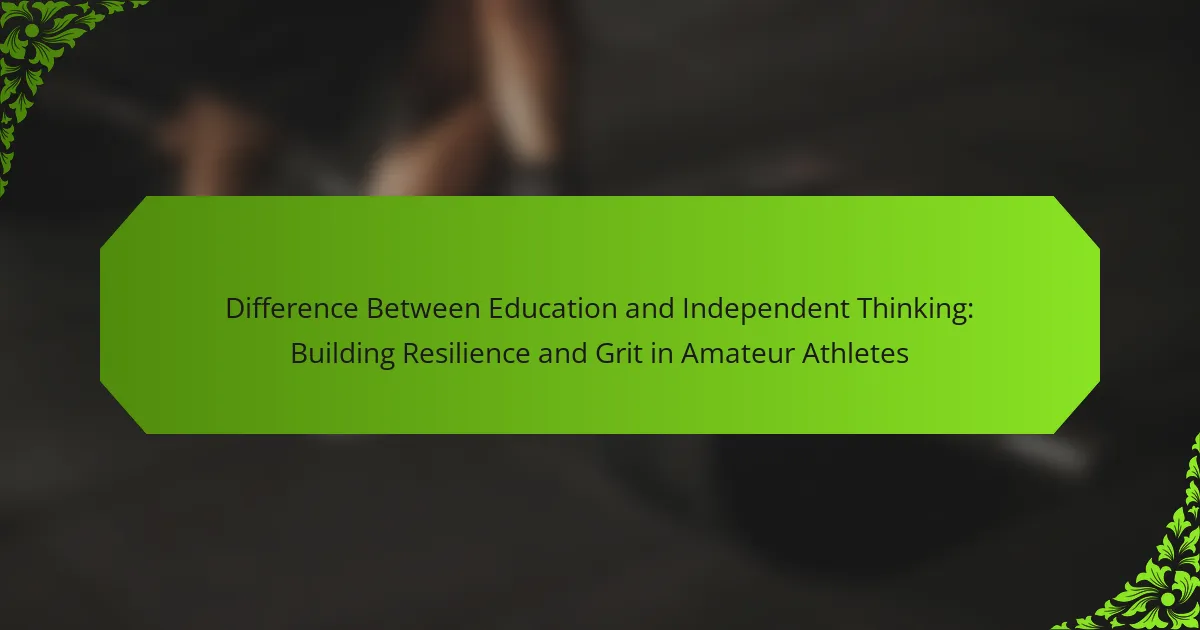Finding balance in life is essential for amateur athletes facing the pressures of training and competition. This article explores resilience as a key factor in enhancing performance, developing grit through goal-setting and challenges, and fostering mental toughness with mindfulness practices. It also addresses common mistakes that hinder resilience and offers strategies for maintaining a balanced approach to training and personal life. Prioritising adaptability, emotional regulation, and social support can significantly improve overall well-being and athletic success.

What is Resilience and How Does it Impact Amateur Athletes?
Resilience is the ability to bounce back from setbacks, significantly impacting amateur athletes by enhancing their performance and mental well-being. It fosters grit, enabling athletes to persist through challenges and maintain focus on their goals. Studies show that resilient athletes often experience lower stress levels and improved recovery times, which are crucial for sustained athletic development. By cultivating resilience, amateur athletes can achieve a balanced approach to training and competition, ultimately leading to greater success.
Why is Grit Essential for Athletic Success?
Grit is essential for athletic success because it fosters perseverance and determination. Athletes with grit maintain focus on long-term goals, overcoming obstacles and setbacks. Research indicates that grit correlates with higher achievement levels, as it drives consistent effort and resilience. This unique attribute distinguishes successful athletes, enabling them to thrive in competitive environments.
How Can Mental Toughness Enhance Performance?
Mental toughness enhances performance by fostering resilience and grit, enabling athletes to overcome challenges. This psychological strength leads to improved focus, motivation, and the ability to push through adversity. Research indicates that mentally tough athletes often exhibit higher levels of confidence and better stress management, which directly correlates with enhanced performance outcomes. By developing mental toughness, amateur athletes can achieve a balanced approach to competition, maximising their potential in sports.

What Are the Universal Practices for Building Resilience?
Building resilience involves adopting practices that enhance mental toughness and adaptability. Key universal practices include setting realistic goals, maintaining a positive mindset, fostering strong relationships, and embracing challenges. These practices empower amateur athletes to navigate setbacks and improve performance. Regular self-reflection and mindfulness can also enhance resilience, helping individuals manage stress effectively.
How Does Goal Setting Foster Resilience?
Goal setting enhances resilience by providing clear objectives and a sense of direction. It encourages amateur athletes to focus on their progress, fostering grit and mental toughness. Setting achievable goals allows athletes to measure their growth, adapt to challenges, and maintain motivation. Research shows that goal-oriented individuals are more likely to persist through setbacks, reinforcing their resilience over time.
What Role Does Positive Self-Talk Play in Grit?
Positive self-talk enhances grit by reinforcing perseverance and motivation during challenges. This mental strategy cultivates resilience, allowing amateur athletes to maintain focus and push through adversity. Studies indicate that athletes who engage in positive self-talk exhibit improved performance and lower anxiety levels. By fostering a growth mindset, positive self-talk becomes an essential tool in developing mental toughness and sustaining effort in sports.

What Unique Strategies Can Amateur Athletes Use to Develop Grit?
Amateur athletes can develop grit by setting clear goals, embracing challenges, and maintaining a growth mindset. Consistent practice, self-reflection, and seeking feedback also enhance resilience. Engaging in supportive communities fosters motivation and accountability, reinforcing their commitment to personal growth and perseverance.
How Can Visualization Techniques Improve Resilience?
Visualization techniques enhance resilience by fostering mental clarity and emotional regulation. These techniques allow athletes to mentally rehearse scenarios, improving their response to stress. By visualising success, athletes build confidence, which enhances grit and mental toughness. Research indicates that consistent practice of visualization can lead to improved performance under pressure, reinforcing resilience in challenging situations.
What Unique Recovery Practices Support Mental Toughness?
Unique recovery practices that support mental toughness include mindfulness meditation, visualization techniques, and structured goal-setting. Mindfulness meditation enhances self-awareness, helping athletes manage stress effectively. Visualization techniques allow athletes to mentally rehearse performance, boosting confidence and focus. Structured goal-setting provides clear objectives, fostering a sense of achievement that builds resilience over time. These practices contribute to a holistic approach, reinforcing mental toughness in amateur athletes.

What Are the Rare Attributes of Resilience in Sports?
Resilience in sports includes rare attributes such as adaptability, emotional regulation, and social support. These traits enable athletes to navigate challenges effectively. Adaptability allows for quick adjustments to training and competition strategies. Emotional regulation helps maintain focus under pressure. Social support fosters a sense of belonging and motivation, critical for long-term success.
How Does Community Support Contribute to Grit?
Community support significantly enhances grit by providing emotional encouragement, shared experiences, and accountability. This support system helps amateur athletes persist through challenges, fostering resilience and mental toughness. Engaging with a community cultivates a sense of belonging, which can motivate individuals to push their limits. Studies show that athletes with strong community ties report higher levels of grit, demonstrating the unique attribute of social connection in developing perseverance.
What Rare Mindset Shifts Can Help in Overcoming Adversity?
Embracing rare mindset shifts can significantly enhance resilience in amateur athletes facing adversity. One shift is viewing challenges as opportunities for growth, fostering a proactive approach. Another is developing a strong sense of purpose, which fuels motivation during tough times. Practising gratitude can also shift focus from setbacks to progress, enhancing mental toughness. Lastly, cultivating a community for support encourages shared experiences, reinforcing grit and resilience.

How Can Amateur Athletes Balance Training and Life Challenges?
Amateur athletes can balance training and life challenges by developing resilience, grit, and mental toughness. Prioritising time management, setting realistic goals, and maintaining a supportive network are crucial. Incorporating mindfulness practices can enhance focus and reduce stress. Establishing a routine that accommodates both training and personal responsibilities fosters a sustainable balance.
What Time Management Techniques Promote Resilience?
Effective time management techniques enhance resilience by promoting focus and reducing stress. Prioritisation helps athletes manage their training and recovery schedules, ensuring they maintain balance. Techniques such as the Pomodoro Technique improve productivity by breaking tasks into manageable intervals, fostering mental toughness. Setting SMART goals enables clear objectives, enhancing grit and motivation. Additionally, using tools like planners or digital apps can streamline scheduling, allowing for better time allocation and less overwhelm.
How Can Athletes Avoid Burnout While Pursuing Grit?
Athletes can avoid burnout by prioritising self-care, setting realistic goals, and maintaining a balanced routine. Establishing a structured training schedule that includes rest days is crucial. Mental toughness can be developed through mindfulness techniques and positive self-talk. Engaging in diverse activities outside of sport fosters resilience and prevents monotony.

What Are the Common Mistakes Amateur Athletes Make in Building Resilience?
Amateur athletes often overlook key factors when building resilience, leading to setbacks. Common mistakes include neglecting mental recovery, underestimating the importance of rest, and failing to set realistic goals. Many athletes focus solely on physical training, ignoring the mental aspects that contribute to resilience. Additionally, they may not seek support from coaches or peers, which can hinder their growth. Lastly, some athletes exhibit a fixed mindset, resisting challenges that could enhance their mental toughness.
How Can Athletes Recognise and Address Negative Thinking Patterns?
Athletes can recognise negative thinking patterns by monitoring their self-talk and identifying irrational beliefs. To address these patterns, they should practise cognitive restructuring, focusing on positive affirmations and realistic goal-setting. Engaging in mindfulness techniques can also help athletes stay present and reduce anxiety. Regular reflection on performance and emotional responses fosters resilience and mental toughness.
What Pitfalls Should Be Avoided in Grit Development?
To avoid pitfalls in grit development, amateur athletes should focus on maintaining a balanced approach. Common mistakes include overtraining, neglecting mental health, and setting unrealistic goals. Overtraining can lead to burnout and injury, undermining resilience. Ignoring mental well-being can hinder performance and motivation. Setting unattainable goals may result in frustration and decreased confidence. By acknowledging these pitfalls, athletes can cultivate grit effectively.
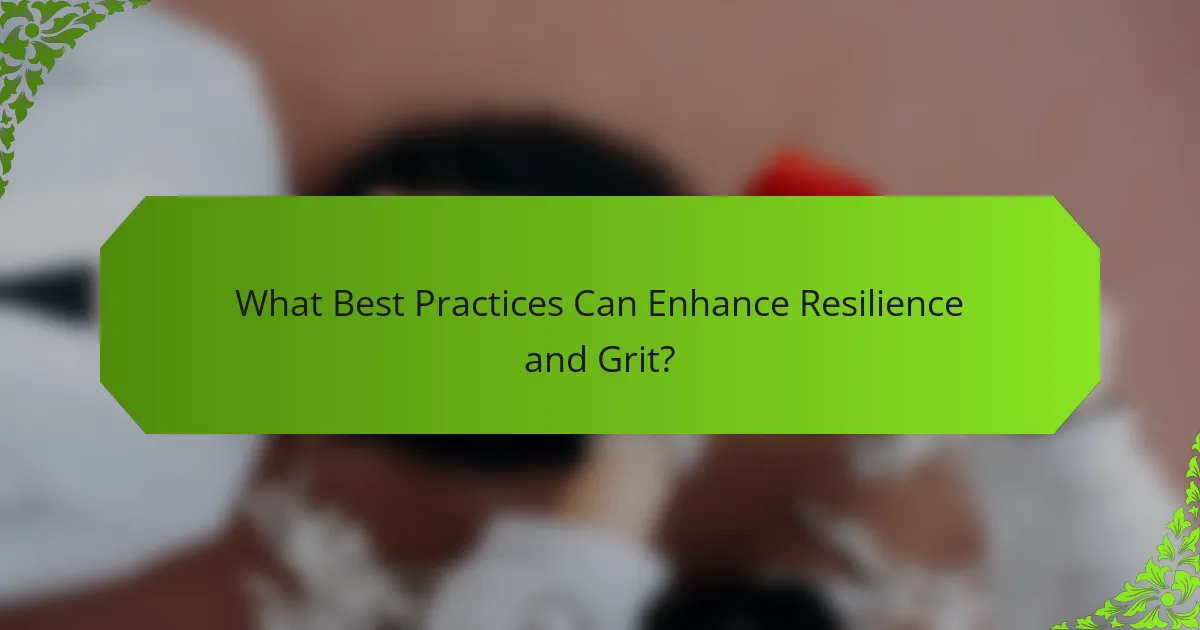
What Best Practices Can Enhance Resilience and Grit?
To enhance resilience and grit, amateur athletes should adopt consistent training routines, set achievable goals, and cultivate a supportive community. Regularly practising mindfulness can improve mental toughness, while maintaining a balanced lifestyle fosters overall well-being. Engaging in reflective journaling helps track progress and emotional responses, reinforcing growth.
How Can Regular Reflection Improve Mental Toughness?
Regular reflection enhances mental toughness by fostering self-awareness and resilience. It allows athletes to evaluate their performance, identify strengths and weaknesses, and set actionable goals. This practice encourages a growth mindset, which is essential for overcoming challenges. Studies show that individuals who engage in regular reflection report higher levels of psychological resilience, enabling them to bounce back from setbacks more effectively. By incorporating reflection into their routines, amateur athletes can develop grit and maintain focus, ultimately improving their overall performance.
What Role Does Consistent Feedback Play in Building Resilience?
Consistent feedback is crucial for building resilience in amateur athletes. It fosters self-awareness, enhances motivation, and promotes a growth mindset. Regular feedback allows athletes to identify strengths and weaknesses, enabling them to adapt and improve. This process cultivates grit, essential for overcoming challenges. Studies show that athletes who receive constructive feedback are more likely to develop mental toughness, which is vital for maintaining balance in life and sports.
How Can Athletes Create a Personal Resilience Plan?
Athletes can create a personal resilience plan by identifying goals, developing coping strategies, and fostering a supportive environment. Start by setting clear, achievable objectives that align with personal values. Next, incorporate techniques such as mindfulness, visualization, and positive self-talk to enhance mental toughness. Building a network of supportive peers, coaches, and mentors provides essential encouragement during challenges. Regularly review and adjust the plan to reflect progress and changing circumstances, ensuring it remains relevant and effective.
